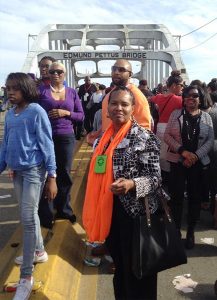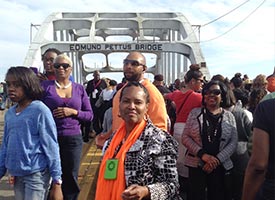By Christine Weerts
SELMA, Ala. — Etta Watts learned a new meaning of the word “courage” while walking in the footsteps of civil-rights marchers over the Edmund Pettus Bridge in Selma, Ala., March 8.
A member of Peace Lutheran Church in Washington, D.C., Watts came to Selma to participate in the 50th anniversary of the Voting Rights Movement led by the Rev. Dr. Martin Luther King Jr., which led to the passage of the Voting Rights Act.

Watts was one of more than 120,000 visitors to Selma to commemorate the courage and commitment of everyday citizens on “Bloody Sunday” — March 7, 1965 — when Sheriff Jim Clark, his deputies and Alabama state troopers attacked marchers at the Edmund Pettus Bridge with clubs and tear gas as they tried to march to Montgomery, injuring more than 100 people. The brutality evoked a strong response nationwide to support King’s efforts.
In 1964, despite years of efforts by local citizens, only 2 percent of registered voters in Dallas County (where Selma is located) were black, although blacks comprised 50 percent of the population.
Watts commended the faith of those earlier foot soldiers, some as young as 8, who marched for justice.
“I have driven over the Edmund Pettus Bridge before, but this is the first time I walked across it,” Watts said. “I sensed the courage of the original marchers. They were just everyday people who risked everything — without giving up and without violence — to stand up for what they knew was right.”
President Barack Obama, First Lady Michelle Obama and their two daughters attended the commemoration, as did former President George W. Bush and wife Laura, and 90 congressmen.
“When it feels the road is too hard, when the torch we’ve been passed feels too heavy, we will remember these early travelers, and draw strength from their example,” President Obama said as he spoke at the base of the bridge March 7.
Civil Rights Symposium
Watts also was among the many visitors to Concordia College Alabama (CCA) in Selma, which sponsored its third annual Civil Rights Symposium March 1-8 and hosted students from a number of higher-education institutions, including Concordia University, Irvine, Calif., and Concordia College—New York, in Bronxville, N.Y.
The symposium drew many Lutheran clergymen. Among them were:
- Rev. Roosevelt Gray, director of Black Ministry—LCMS Office of National Mission, from St. Louis.
- LCMS Southern District President Rev. Kurtis Schultz of Birmingham, Ala.
- Rev. Dr. Don Johnson, executive director of Lutheran Indian Ministries, Brookfield, Wis., who spoke about how the Civil Rights Movement helped Native Americans.
- LCMS Board of Directors member Rev. Dr. Victor Belton of Decatur, Ga., who preached in chapel at CCA.
- Rev. Paul Ernewein, Slidell, La., who cooked jambalaya for students.
- Rev. Joseph Ellwanger, Milwaukee, a “foot soldier” and author of a recently published memoir, Strength for the Struggle, who shared about his civil-rights journey while serving as pastor at St. Paul Lutheran Church in Birmingham, Ala.
- Rev. Dr. Martin Marty, Chicago, keynote speaker, who responded to King’s call for clergy across the nation to come march in Selma in 1965.
- Rev. Dr. McNair Ramsey, Selma, a student in 1965 who marched for voting rights.
- Rev. Donald Anthony from Concord, N.C., who led Sunday worship and whose church’s Cub Scout troop carried the CCA banner March 8 in the bridge-crossing ceremony.
- Rev. Richard Ziehr, Buda, Texas, author of The Struggle for Unity, a book about Civil Rights and its impact on LCMS congregations in the South.
Ambassadors of Reconciliation, an LCMS Recognized Service Organization, presented at the symposium and Blake Flattley, worship leader at Our Saviour Lutheran Church in Rego Park, N.Y., helped lead worship music.
“The CCA symposium gave students, faculty, staff and visitors the opportunity to reflect and dialogue about the historic events as the people of Selma sought their voting rights, and what effects it has for us today,” said Gray, who preached a chapel sermon on the theme “Free at last! Free at last! Thank God Almighty, we are free at last!” (Gal. 5:1).
Members of the 1965 Luther League at LCMS St. Paul Lutheran Church, Birmingham, reunited in Selma for the 50th anniversary and to support their former pastor, the Rev. Joseph Ellwanger — son of the former president of Concordia College — who spoke at the symposium.
“Rev. Ellwanger wrote in his book how he gained strength observing us brave Luther Leaguers enduring hostility from the Ku Klux Klan for such simple things as engaging in fellowship with white League members or visiting white Lutheran churches,” said James Nelson Jr. from Raleigh, N.C. “I will always consider St. Paul my home church.”
Other foot soldiers who spoke at the symposium included:
- Sheyann Christburg, whose story was told in the Disney movie, “Selma, Lord, Selma”;
- Rev. F.D. Reese, a pastor and teacher who worked for voting rights before 1965 and wrote the letter inviting King to come to Selma; and
- Rev. James Perkins — Selma’s first black mayor, elected in 2008.
Also participating were Lutheran Dianne Harris (a foot soldier whose story is shared in the Spring 2015 Lutheran Woman’s Quarterly) and John Ballard, who marched in Selma in 1965 as a Harvard student.
On NBC ‘Today’ show
Harris and Ballard were featured with Concordia students on the March 6 NBC Today show.
“The past generation sacrificed a lot so that we can have freedom today and the right to vote,” said Concordia Alabama student Feven Yetola. “I realized that everything can be taken away by not participating in the political process. Now I understand the value of being in school and the responsibility I have to use my knowledge for good.”
Students from across the country attending the symposium and Selma events said they were moved deeply by the stories of the foot soldiers, sharing Watts’ admiration for their faithful bravery despite being jeered at, spit on, arrested, beaten — and some even killed — while seeking the right to vote.
“The biggest impressions for me were the brave individuals who walked over the Edmund Pettus Bridge in 1965,” said Concordia, Irvine, student Jason Duck. “They knew the danger that was before them, yet they marched on. It was truly the powerless confronting the powerful, the disenfranchised speaking out against the enfranchised, and the voiceless being heard over the audible. With all the odds against this movement, they were able to stand strong and ultimately prevail.”
Christine Weerts (csweerts@bellsouth.net) is a fourth-generation LCMS Lutheran and freelance writer in Selma, Ala.
Posted March 25, 2015 / Updated March 26, 2015 / Updated March 27, 2015
